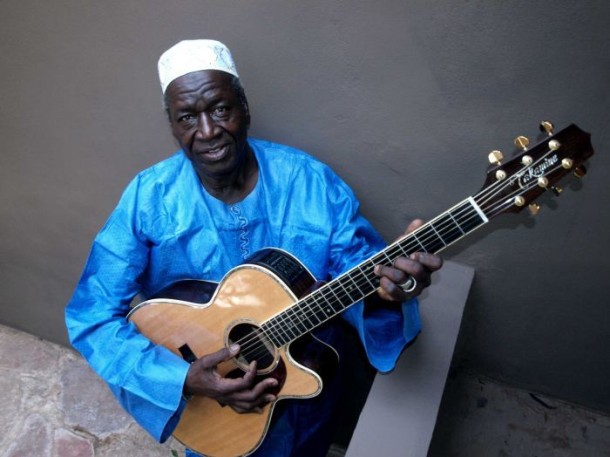Boubacar Traoré carries within him all the beauty of African blues. A diamond among the jewels of Mandingo music, he shines with the dark glow of exceptional purity. Only the voice of “Kar Kar” (a footballing nickname meaning “The Dribbler” given him by his friends, who also love the beautiful game) can blend Niger and Mississippi river alluvia with such moving authenticity. His unique, inimitable, self-taught guitar technique owes a great deal to his kora influences, but its shades and phrasing also suggest the great black bluesmen of the deep South: Blind Willie McTell, Robert Johnson, Muddy Waters and others.
Back in the 60s when the euphoria of African independence reigned, the 20-year-old Boubacar Traoré was Mali’s Chuck Berry and Elvis Presley. In those days, Malians would wake to the sound of Boubacar’s poignant voice and saturated riffs. On the 19th November 1968, a bitter wind blew across Mali when Modibo Keita’s socialist government was overthrown by a military coup. Kar Kar and his songs were exiled from the airwaves. Returning penniless to Kayes, his hometown in the Kassonké region (to the northeast of Bamako near the Senegalese border), Boubacar became a farm worker, opened a shop with his elder brother – the one who had introduced him to the guitar and given him his first one – and worked to feed his family.
In Paris, an English producer discovered him and took him to the studio to record his first album, “Mariama”, in 1990. Boubacar Traoré’s life changed quickly after the record’s release. He recorded another 6 albums: Sécheresse (Drought) in 1992; Les enfants de Pierrette (Pierrette’s Children) in 1995, Sa Golo in 1996, Maciré in 1999, music from the eponymous film directed by Jacques Sarasin: Je chanterai pour toi (I’ll Sing for You) in 2002, and Kongo Magni in 2005. Kar Kar made up for lost time, triumphing on stage first in Europe and then in the United States and Canada.
Boubacar Traoré is a discreet, exceptional artist. Mali Denhou, his first album since 2005, was recorded in warm, friendly surroundings in June 2010 at Studio Moffou, set up by Salif Keita on the outskirts of Bamako. Kar Kar worked with the same musical cast who had performed with him all over the world for years. The first takes were laid down with his old friend Madieye Niang on gourd and Vincent Bucher on harmonica, playing in live conditions. Boubacar Traoré is respected and acclaimed in Mali, especially by young people. They are rediscovering the artist, one of the founding fathers and great ambassadors of modern Mandingo music.
Boubacar Traoré in the Press:
Video: Boubacar Traoré in Brooklyn (New York Times)
Live: Boubacar Traoré (Fader)
Live: Boubacar Traore Brings His Brand Of The Blues To Brooklyn (The Village Voice)
Music Interviews: Boubacar Traoré (NPR)
Boubacar Traoré (San Francisco Weekly)

